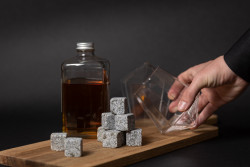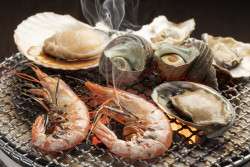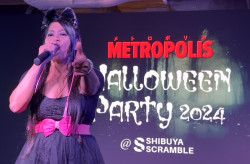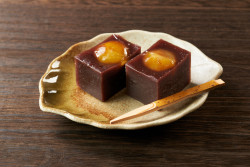
April 26, 2013
Takako Minekawa & Dustin Wong
The indietronic pair’s “Party on a Floating Cake”
By Metropolis
Originally published on metropolis.co.jp on April 2013

Some matches are made in heaven; some don’t even bother waiting to get there. Indietronic pair Takako Minekawa and Dustin Wong’s new album Toropical Circle sounds as if it were made somewhere near the gates to heaven—somewhere, if you will, at a “Party On a Floating Cake.”
“The song was written on a summer’s day,” singer and keyboardist Minekawa tells Metropolis about the album’s lead single in an interview before its release in May. “While we were writing, the sun was pouring into the room. We were experimenting on how I can layer my voice on top of Dustin’s loops.”
Guitarist Wong (formerly of Ponytail) sets the scene. “We wrote it in my mom’s hula dancing studio—it’s a really nice room. I placed a few prisms where the sunlight comes through so the colors could flow in. The songwriting felt organic, like two people working on one drawing.”
Veteran Japanese singer-songwriter Minekawa and recent indie fave Dustin Wong met in Tokyo in the summer of 2011, when Minekawa went to go see Wong’s show in Tokyo. Chinese-American Wong had been a fan of Minekawa’s music growing up as an expat in Tokyo. After their meeting they began to correspond.
Beginning with some sessions at a rental studio in Tokyo, their mutual interests in music and mythology finally led to Toropical Circle, which is a pair work right down to the album cover and music video for “Party on a Floating Cake.” It also happens to be Minekawa’s first release in 13 years.
“I was really happy to meet her since I’d been a fan of her music for a really long time,” says Wong, remaining coy on the topic of whether he is romantically involved with Minekawa. “I first thought she was very shy and quiet. But as I got to know her, I saw that she is very open minded, kind and her intuitions are just spot on, genius.”
[youtube]uHZNisAZwjU[/youtube]
“I knew his music prior to meeting him and his sounds felt very familiar,” Minekawa adds from her own perspective. When I saw him perform it had a warmer energy than in the recordings. There happened to be a mutual acquaintance at the show and he introduced me to him. I was too shy to shake his hand. I remember asking him about some of his guitar pedals and he explained the different knobs, referencing them as hands of a clock, and time.”
Putting aside whether or not they complement each other romantically, both Minekawa and Wong are definitely starry-eyed when it comes to the arts.
“Romanticism is extremely important in music,” Wong stresses. “It’s the soul that soars sound into melody. It’s a type of idealism, which touches directly on beauty and emotion. Totally crucial to what music is about.”
“By looking at clouds, light, dust, we observe and use our imagination,” says Minekawa. “Through this our hearts are always melting. This could be the foundation to our sounds.”
Toropical Circle shows a duo musically made for one another. Wong’s intricately looped guitar layers provide just the right accompaniment to Minekawa’s ethereal vocals. Evocative song titles like “Mirror Underwater in a Magic Lantern” and “Swimming Between Parallel Times” conjure a sense of storytelling somewhere between mythology and science fiction.
“All those things are a means to really expand our imagination and open ourselves to different possibilities,” Wong explains.
“Science, history and mystery open new doors,” Minekawa continues. “Mythology, not just as a type of history—but through imaginative interpretations—all kinds of doors start opening. To imagine is to overflow, and in that moment you are constantly reborn.”
The musical techniques Minekawa and Wong use to embroider their respective contributions together blend purposefulness and alchemy. “With ‘Swimming Between Parallel Times’ Takako bought a sampler that can also be used as a keyboard,” Wong relates. ”We recorded voices, instruments and other miscellaneous objects by hitting or blowing on them. We then put those sounds through the keyboard. The drum sound you hear in the beginning of that song is a sample of a water tank being hit.”
The pair debut their album in a series of concerts this spring, and the hype is spreading from staid publications to hip indie websites such as Tiny Mix Tapes.
“We’ll have all sorts of things, I set up my pedals a bit differently compared to my solo performance—we’ll have a drum machine and that sampler keyboard we talked about earlier,” Wong says, previewing their upcoming release party at Shibuya’s O-Nest.
“The drum machine is actually Dustin’s father’s drum machine from the ’80s, notes Minekawa, who also adds that the loop pedal on the floor will “intertwine their sounds.”







